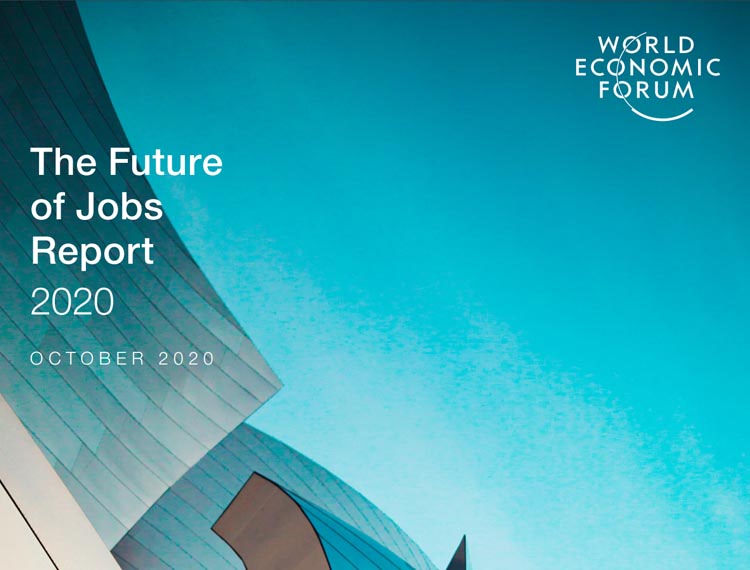World Economic Forum: The Future of Jobs Report 2020

The Future of Jobs report maps the jobs and skills of the future, tracking the pace of change. A significant volume of research on the theme of the #FutureofWork has emerged since the World Economic Forum (@WEF) published its initial report on the subject.
It aims to shed light on the pandemic-related disruptions in 2020, contextualized within a longer history of economic cycles and the expected outlook for technology adoption, jobs and skills in the next five years.
The COVID-19 pandemic-induced lockdowns and related global recession of 2020 have created a highly uncertain outlook for the labour market and accelerated the arrival of the future of work.
The Future of Jobs Report 2020 aims to shed light on:
- The pandemic-related disruptions thus far in 2020, contextualized within a longer history of economic cycles, and
- The expected outlook for technology adoption jobs and skills in the next five years.
Despite the currently high degree of uncertainty, the report uses a unique combination of qualitative and quantitative intelligence to expand the knowledge base about the future of jobs and skills.
It aggregates the views of business leaders—chief executives, chief strategy officers and chief human resources officers–on the frontlines of decision-making regarding human capital with the latest data from public and private sources to create a clearer picture of both the current situation and the future outlook for jobs and skills.
The report also provides in-depth information for 15 industry sectors and 26 advanced and emerging countries.
Read The Future of Jobs Report 2020 in full here.
Jobs of Tomorrow: Mapping Opportunity in the New Economy
22 Jan 2020 – Through new data sources, we can gain unprecedented insights into emerging opportunities for employment in the global economy, and granular understanding of the skill sets needed by professionals. This new data reveals that 96 jobs across seven professional clusters are fast emerging in tandem reflecting “digital” and “human” factors driving growth in the professions of tomorrow.
The jobs of the future are set to grow by 51% in the horizon up to 2020 and we project they will present 6.1 million job opportunities globally.
These reflect the adoption of new technologies—giving rise to greater demand for Green Economy jobs, roles at the forefront of the Data and AI economy as well as new roles in Engineering, Cloud Computing, and Product Development.
On the other hand, emerging professions also reflect the continuing importance of human interaction in the new economy, giving rise to greater demand for Care economy jobs; roles in Marketing, Sales and Content production; as well as roles at the forefront of People and Culture.
The growth and absolute scale of these opportunities will be distinctively determined by the choices and investments made by governments today.
This report demonstrates that we have at our fingertips tools that offer unprecedented, granular insight into the nature of opportunity in the labour market. The emerging imperative is to use such tools wisely and in the service of workers in their quest for productive, fulfilling employment.
Read Jobs of Tomorrow: Mapping Opportunity in the New Economy in full here.
World Economic Forum: The Future of Jobs Report 2018
17 Sept 2018 – What the future of work might hold is a concern that resonates broadly and that has fuelled extensive discussion among policy-makers, business leaders and individual workers.
Over the past few years, academics, think tanks, strategy consultants and policy-makers have debated what the future of work might look like, how it can be productively shaped for the benefit of economies and societies, and the implications of changes to work for individuals, for their livelihoods, and for the youngest generations studying to enter the future workforce.
The Fourth Industrial Revolution is interacting with other socio-economic and demographic factors to create a perfect storm of business model change in all industries, resulting in major disruptions to labour markets.
New categories of jobs will emerge, partly or wholly displacing others. The skill sets required in both old and new occupations will change in most industries and transform how and where people work.
It may also affect female and male workers differently and transform the dynamics of the industry gender gap.
The Future of Jobs Report 2018 aims to unpack and provide specific information on the relative magnitude of these trends by industry and geography, and on the expected time horizon for their impact to be felt on job functions, employment levels and skills. Future of Jobs Report 2019?
A significant volume of research on the theme of the #FutureofWork has emerged since the World Economic Forum (@WEF) published its initial report on the subject — The Future of Jobs: Employment, Skills and Workforce Strategy for the Fourth Industrial Revolution — at the Forum’s Annual Meeting in January 2016.











Responses